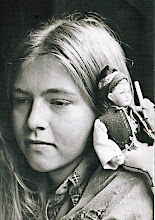
In the 1880s, the 6-day races were very popular in England. Participants would race for six days or until they gave in to fatigue. That's how crazy people were about bicycles. In the U.S., the event was modified slightly to include two-man teams, so they could trade off and race for the entire six days. It's still total insanity if you ask me.
The first Tour de France took place in 1903. There were also road races in the U.S., but Velodrome or track racing was immensely popular as a spectator sport. It was exciting because of the speed that riders could achieve, racing in close quarters on a banked track. These fellows were probably both velodrome racers, though their pictures were taken in a studio. Note the medals on the cyclists shirt below:

To find out more about the history of the racing bicycle, visit The Racing Bicycle. To see more wonderful old photos and rich family histories, check in with the Sepia Saturday blog.















Where do you find these cards?!
ReplyDeleteI love the first one best but I really do like both very much.
Thank you for your insight about my last "camera" post. I appreciate your wise commentary.
1903 the first Tour de France! Wow!~ Love the PC
ReplyDeleteQuite wonderful -- like idealized Greek athletes.
ReplyDeleteThese are great pictures. A taste of life before we began to indulge in softer pastimes.
ReplyDeleteLily, these are from John Korinek. You can read about him on the December 21, 2009 post: http://postcardparadise.blogspot.com/2009/12/tribute-to-our-favorite-mailman.html
ReplyDeleteReminds me that I need to get my bike out, now that the weather is getting nicer. :)
ReplyDeleteThe second picture is quite clever. I can't make out how the bicycle was kept immobile for the photograph.
ReplyDeleteEvelyn in Montreal
Such great photos! Both my son and my husband are avid cyclists and will enjoy this post. Thanks!
ReplyDeleteVery interesting historical information. I never thought about bicycling being a sport at that point in history.
ReplyDeleteSuper photos! Interesting post.
ReplyDeleteAnother great post - although I have a dim view of the sport because I once dated a cyclist and his obsession with All Things Bicycle was too tiring (and he certainly wasn't as lean as these fellows). Happy Saturday!
ReplyDeleteIt is so amazing that they called them safety bikes when in actually they were the correct way for them to be designed. The engineering of pumping on a big wheel really wasn't as efficient as having a small wheel pump a chain to a smaller wheel attached to the big wheel. They are great photos.
ReplyDeleteBeautiful Photos. I, also, was wondering how they kept the bikes standing while photographing. Retouching, maybe.
ReplyDeleteFascinating, LOVE the photos!
ReplyDeleteQuite clever ...before action shots were possible! Doesn't quite look like a Lance Armstrong, though, does he!? ha....
ReplyDeleteFun stuff!
ReplyDeleteFabulous, but I too want to know how second bike was held upright while the photograph was taken! The back wheel in a stand, maybe, that was airbrushed out later??
ReplyDeletei like the way you have combined both your blog theme and the sepia saturday idea.
ReplyDeletethanks for your flattering comment at my place, i hope to get back into sepia saturday after a bit of an absence so maybe we'll catch up again
cheers
k
They were made of tougher stuff back then. I'm not sure which I enjoyed more, your history or the photos!
ReplyDeleteBoth cards are great. I really enjoyed reading about the history of racing too.
ReplyDeleteWhat fabulous cards. With both of them there is something so balanced and artistic about them - what I am trying to say is that they are fabulous photographs as well as fabulous cards.
ReplyDelete